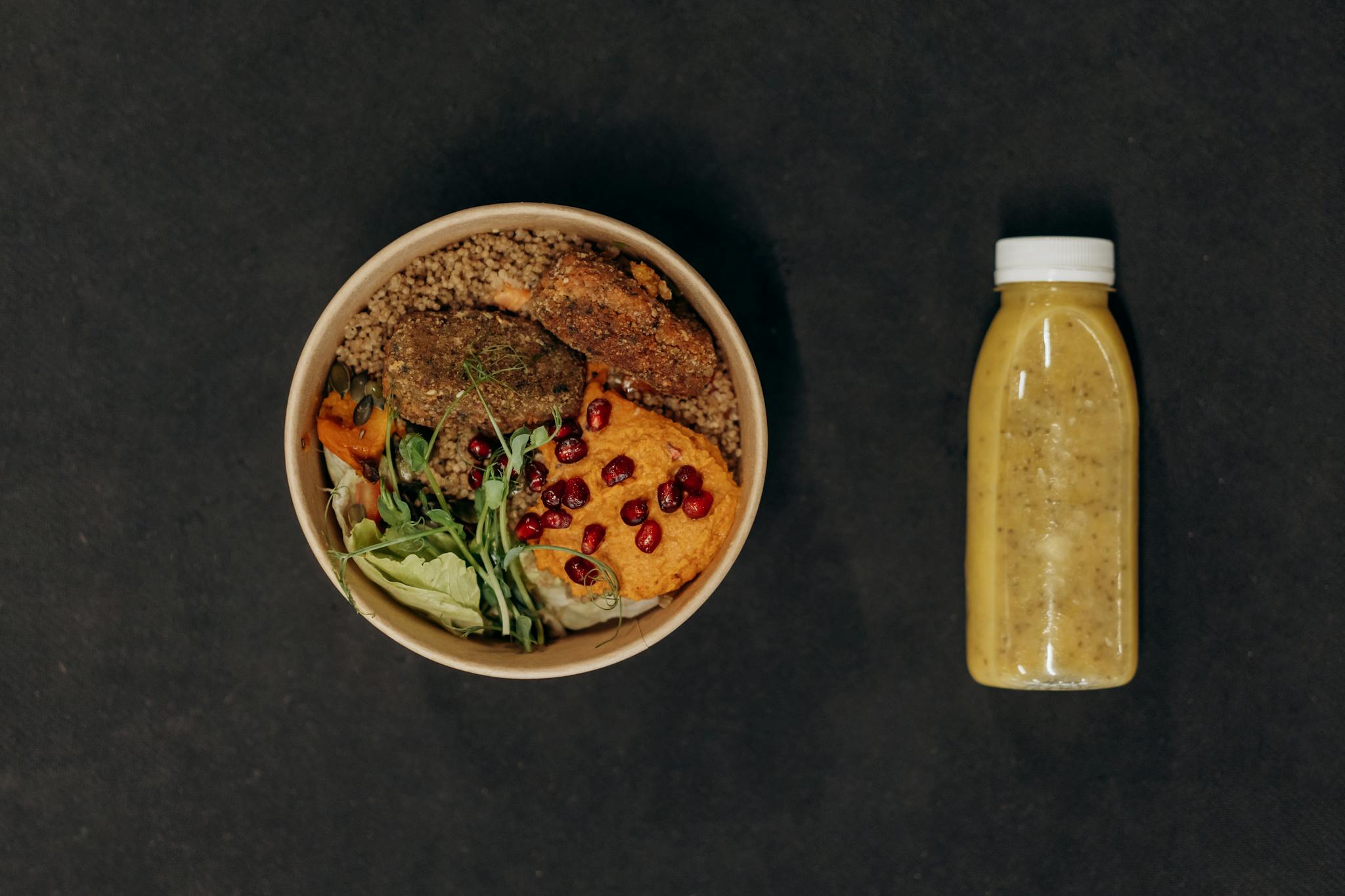12 Best Gut Health Tips In 2024
Gut health is fundamental to overall well-being. The gut, also known as the gastrointestinal (GI) tract, is home to a complex community of microorganisms, including bacteria, viruses, fungi, and other microbes. This community, known as the gut microbiota, plays a crucial role in many bodily functions, including digestion, immune response, and even mental health. Here’s a closer look at why gut health matters and how each of these tips can help you maintain a healthier gut.

Gut Health Matters
Digestive Health: Your gut microbiota helps break down food, absorb nutrients, and produce essential vitamins like B vitamins and vitamin K. A healthy gut ensures smooth digestion and helps prevent issues like bloating, constipation, and diarrhoea.
Immune Function: Did you know about 70% of your immune system is in your gut? The gut microbiota interacts with immune cells to regulate the body’s response to infections and inflammation. Keeping your microbiome balanced supports a robust immune system.
Mental Health: The gut and brain are connected through the gut-brain axis, a communication network involving the nervous system, hormones, and immune signals. Gut bacteria produce neurotransmitters like serotonin, which influence mood, stress levels, and cognitive functions. An imbalanced microbiome can contribute to mental health issues such as anxiety and depression.
Chronic Diseases: Research is increasingly linking gut health to chronic conditions like obesity, diabetes, cardiovascular disease, and even certain cancers. An unhealthy gut microbiome can lead to inflammation, insulin resistance, and other metabolic issues.
Expanded Tips for Optimal Gut Health
1. Incorporate Probiotics and Prebiotics into Your Diet
Probiotics: Probiotics are live bacteria and yeasts that are beneficial for your health, especially your digestive system. They help maintain a healthy balance of gut bacteria and can improve conditions like irritable bowel syndrome (IBS) and diarrhoea.
- Sources: Besides yogurt and kefir, try adding miso soup, tempeh, and fermented pickles to your diet. These foods contain live cultures that can help replenish and diversify your gut microbiota.
Prebiotics: Prebiotics are types of fibre that your body cannot digest. They serve as food for probiotics, helping these beneficial organisms grow and thrive in the gut.
- Sources: Jerusalem artichokes, leeks, chicory root, and dandelion greens are excellent sources of prebiotics. Incorporating a variety of these foods ensures your probiotics have the nutrients they need to support gut health.
Tip: Try combining both probiotics and prebiotics in your meals. For example, pair yogurt (probiotic) with bananas or berries (prebiotic) for a gut-friendly breakfast.
Further Insights: Research continues to explore the benefits of different probiotic strains and combinations. Some recent studies suggest that multi-strain probiotics might be more effective than single-strain options. Additionally, incorporating a variety of fermented foods can help diversify the types of beneficial bacteria in your gut.
2. Increase Fiber Intake
Fiber is a type of carbohydrate that your body cannot digest. It plays a critical role in maintaining a healthy digestive system and supporting a diverse gut microbiome.
- Types of Fiber:
- Soluble Fiber: Found in foods like oats, beans, lentils, apples, and citrus fruits, soluble fibre dissolves in water to form a gel-like substance, which can help lower blood cholesterol and glucose levels.
- Insoluble Fiber: Found in whole grains, nuts, and vegetables like cauliflower and potatoes, insoluble fibre adds bulk to stool and helps food pass more quickly through the stomach and intestines.
Latest Insight: A 2024 meta-analysis published in The Lancet emphasizes the role of fibre in preventing chronic diseases such as cardiovascular disease and colorectal cancer, highlighting its importance beyond gut health.
Tip: Gradually increase your fibre intake to prevent bloating and discomfort. Aim for at least 25-30 grams of fibre per day, including a mix of soluble and insoluble fibre.
Further Insights: Different fibres feed different types of bacteria in your gut. By eating a variety of fibre-rich foods, you can support a more diverse and resilient microbiome. Additionally, resistant starches, found in foods like cooked and cooled potatoes, green bananas, and legumes, act as prebiotics and further support gut health.
3. Stay Hydrated
Water is essential for the health and function of every cell in your body, including those in your gut. Adequate hydration helps maintain the mucosal lining of the intestines, which serves as a barrier to harmful pathogens.
Latest Insight: Recent research suggests that drinking mineral water with high sulphate content can have additional benefits for gut health, promoting the growth of beneficial bacteria.
Tip: In addition to water, include other hydrating beverages like herbal teas. Avoid sugary drinks and limit caffeine and alcohol, as they can dehydrate your body.
Further Insights: Staying hydrated helps prevent constipation, a common issue that can affect gut health. Adequate water intake also supports the balance of electrolytes in the body, which is important for overall digestive function. Consider carrying a water bottle with you throughout the day to ensure you drink enough.

4. Avoid Excessive Sugar and Artificial Sweeteners
Sugar and artificial sweeteners can disrupt the balance of gut bacteria. High sugar intake promotes the growth of harmful bacteria and yeast, leading to dysbiosis (an imbalance of the microbiota).
Latest Insight: Research indicates that artificial sweeteners like aspartame, sucralose, and saccharin can negatively impact glucose metabolism by altering gut bacteria, even in the absence of calories.
Tip: Reduce sugar intake by avoiding processed foods and sweetened beverages. Use natural sweeteners like stevia, erythritol, or monk fruit as alternatives, but in moderation.
Further Insights: Excessive sugar can lead to the overgrowth of harmful bacteria and fungi like Candida, contributing to gut dysbiosis. Moreover, artificial sweeteners, despite being low or zero-calorie, have been shown to negatively impact gut microbiota diversity and function. Reading ingredient labels and choosing whole, unprocessed foods can help you avoid these hidden disruptors.
5. Manage Stress Levels
Stress can have a profound impact on gut health. The gut-brain axis means that your emotional and mental state can directly affect your gut microbiota. Chronic stress can lead to changes in gut bacteria, increasing the risk of gastrointestinal disorders like IBS.
Latest Insight: A 2024 study published in Psych neuroendocrinology found that mindfulness-based stress reduction (MBSR) can significantly improve gut health and reduce symptoms of IBS.
Tip: Practice daily stress-reduction techniques like meditation, yoga, or deep-breathing exercises. Even a short daily walk in nature can help lower stress levels and benefit your gut.
Further Insights: Stress can increase gut permeability, commonly known as “leaky gut,” which allows harmful substances to enter the bloodstream and trigger inflammation. By managing stress through techniques like progressive muscle relaxation, biofeedback, and engaging in hobbies you enjoy, you can support a healthier gut environment.
6. Get Enough Sleep
Quality sleep is essential for the regulation of circadian rhythms in the gut microbiota. Disrupted sleep can lead to an imbalance in gut bacteria, contributing to metabolic issues and inflammation.
Latest Insight: Research in 2024 from Sleep Medicine Reviews links poor sleep hygiene with a decreased diversity of gut microbiota, emphasizing the need for consistent, quality sleep.
Tip: Establish a bedtime routine that promotes relaxation. Limit screen time before bed, create a dark and quiet sleeping environment, and stick to a consistent sleep schedule, even on weekends.
Further Insights: Sleep affects the production of hormones like cortisol and melatonin, which play roles in gut health. Poor sleep can lead to increased cortisol levels, which can negatively impact the gut microbiota. Prioritizing sleep hygiene by maintaining a regular sleep schedule and creating a restful sleep environment can help regulate these hormones and support gut health.

7. Limit Antibiotic Use
Antibiotics are life-saving medications that can eliminate harmful bacterial infections. However, they also kill beneficial bacteria in the gut, which can lead to an imbalance and associated digestive problems.
Latest Insight: Probiotics taken during and after antibiotic treatment can help replenish beneficial bacteria and reduce the risk of antibiotic-associated diarrhoea.
Tip: Only use antibiotics when prescribed by a healthcare provider. Discuss the necessity and possible alternatives with your doctor and consider taking a high-quality probiotic supplement during and after your course of antibiotics.
Further Insights: To minimize the impact on your gut microbiota, follow your healthcare provider’s instructions carefully and complete the full course of antibiotics as prescribed. Eating a balanced diet rich in fibre and fermented foods can also support the recovery of your gut microbiome after antibiotic treatment.
8. Eat a Diverse Range of Foods
A diverse diet leads to a more diverse microbiome, which is beneficial for health. Different foods provide various types of nutrients and fibres that feed different strains of bacteria.
Latest Insight: A 2024 study in Cell demonstrated that dietary diversity is directly linked to microbiome diversity, which in turn is associated with better immune function and reduced inflammation.
Tip: Try new fruits, vegetables, grains, and proteins. Incorporate a “rainbow” of colours in your meals to ensure a variety of phytonutrients and fibres. Experiment with different cuisines and cooking methods to keep your diet interesting and diverse.
Further Insights: Different foods introduce unique compounds and fibres that nourish different types of gut bacteria. By eating a wide variety of plant-based foods, you can enhance the resilience and adaptability of your gut microbiome. Seasonal and local produce can be especially beneficial, as they are often fresher and richer in nutrients.
9. Engage in Regular Physical Activity
Exercise has numerous benefits for the gut. It promotes the growth of beneficial bacteria, improves gut motility, and reduces inflammation. Physical activity can also help manage stress and support a healthy weight, both of which are important for gut health.
Latest Insight: Recent findings in Gut Microbes suggest that both aerobic and resistance exercises can positively affect the gut microbiome. High-intensity interval training (HIIT) is particularly effective in promoting microbial diversity.
Tip: Include a mix of aerobic activities (like walking, running, or swimming) and resistance training (like weightlifting or body-weight exercises) in your weekly routine. Aim for at least 150 minutes of moderate-intensity exercise per week.
Further Insights: Physical activity increases the production of short-chain fatty acids (SCFAs) in the gut, which have anti-inflammatory properties and support the integrity of the gut lining. Regular exercise also helps regulate bowel movements and prevent constipation, enhancing overall gut health.
10. Avoid Smoking and Limit Alcohol Consumption
Smoking and excessive alcohol intake can harm the gut microbiome by reducing the number of beneficial bacteria and increasing inflammation. Both habits are linked to an increased risk of gastrointestinal diseases.
Latest Insight: Ongoing research continues to show the negative impact of smoking and heavy drinking on gut health. Recent studies emphasize the gut microbiome’s capacity to recover following smoking cessation and reduced alcohol intake.
Tip: If you smoke, seek resources and support to quit. Limit alcohol intake to moderate levels – up to one drink per day for women and up to two drinks per day for men. Consider alcohol-free days to give your gut a break and support microbiome recovery.
Further Insights: Smoking cessation can lead to rapid improvements in gut microbiota diversity and composition, reducing the risk of digestive disorders and inflammation. Similarly, reducing alcohol consumption can help restore the balance of gut bacteria, improve liver function, and support overall health.

11. Practice Intermittent Fasting
Intermittent fasting (IF) is an eating pattern that cycles between periods of fasting and eating. It can have a positive impact on gut health by giving the digestive system a break and allowing time for repair and rejuvenation.
Latest Insight: Recent studies have shown that intermittent fasting can increase microbial diversity and promote the growth of beneficial bacteria. Fasting periods can also enhance autophagy, a process where cells remove damaged components and regenerate.
Tip: Start with a simple fasting regimen, such as the 16/8 method (fasting for 16 hours and eating during an 8-hour window). Gradually adjust the fasting and eating windows to find a routine that works best for your lifestyle and health goals.
Further Insights: Intermittent fasting may also improve metabolic health, reduce inflammation, and promote weight loss, all of which are beneficial for gut health. It can help regulate blood sugar levels and reduce the risk of insulin resistance, further supporting a healthy microbiome.
12. Consume Polyphenol-Rich Foods
Polyphenols are plant compounds that act as antioxidants and have numerous health benefits. They are found in a variety of foods, including fruits, vegetables, tea, coffee, and red wine.
Latest Insight: Polyphenols have been shown to have prebiotic effects, promoting the growth of beneficial bacteria in the gut. They can also reduce inflammation and protect against oxidative stress.
Tip: Include a variety of polyphenol-rich foods in your diet, such as berries, dark chocolate, green tea, and spices like turmeric and ginger. Aim for a colourful and diverse diet to maximize the intake of these beneficial compounds.
Further Insights: Polyphenols can help maintain the balance of gut bacteria by inhibiting the growth of harmful pathogens and supporting beneficial microbes. Regular consumption of polyphenol-rich foods can improve gut barrier function and reduce the risk of chronic diseases.
Conclusion
Maintaining gut health is a multifaceted approach that involves dietary choices, lifestyle habits, and mindful practices. By incorporating these twelve tips into your daily routine, you can support a balanced and thriving gut microbiome.
Remember, the journey to optimal gut health is a marathon, not a sprint. Consistent, small changes can lead to significant improvements in your gut health and overall well-being. Listen to your body, make informed choices, and enjoy the benefits of a healthy gut for a healthier, happier life.
By prioritizing your gut health, you’re investing in your entire body’s well-being. With the right approach, you can enjoy better digestion, a stronger immune system, improved mental health, and a reduced risk of chronic diseases. Start today by making mindful choices that support your gut, and reap the benefits of a healthier, happier life.
Resources
- Harvard Nutrition Source
- Human Microbiome Project
- Frontiers in Microbiology
- Sleep Medicine Reviews




